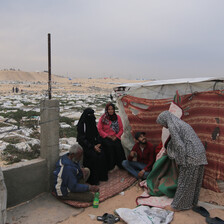The Electronic Intifada 26 November 2023

Israa Ahmed
In Gaza, a family’s world can be crushed in an instant.
On 10 October, Israeli warplanes attacked the home of the Ahmed family.
Israa Ahmed managed to survive. She was trapped under rubble for 13 hours before being rescued.
“I tasted death,” Israa said.
“My mother, brother and my nephew – a 5-year-old child – have been killed. My father and one of my other brothers were at the mosque. When they returned, the house was reduced to rubble.”
Israa is a doctor at Nasser hospital in Khan Younis, southern Gaza.
Israa’s mother was a school principal. Her late brother Bilal was a math teacher.
They are among the many teachers who have been killed during the current war.
Israa described her terrifying experience.
“Suddenly, everything collapsed beneath me. The ground shook, and things fell from the ceiling. I could not understand what was happening. Maybe a bomb mistakenly hit our house. Why is everything falling apart? Why is there so much gunpowder and dust filling my lungs? Yes, we’re in a war, but I was reassured that I wouldn’t die. I don’t know where this false sense of security came from.”
While beneath the rubble, Israa struggled to use her phone.
She could not see the numbers on the screen, so she tried face recognition. Covered in rubble, her face proved unrecognizable.
After a number of unsuccessful attempts to use her phone, she was locked out of it.
“Our home was heaven”
In an excruciatingly tight space, gasping for breath, Israa began to lose hope. She had no fractures or bleeding yet she feared that she would die by suffocation.
“I did not expect I would survive,” she said. “I recited the shahada [declaration of faith] and started to pray for forgiveness and a peaceful departure.”
Eventually, she heard a voice calling “Anyone here? Anybody alive?”
“I’m here,” Israa cried out.
“Al-Qahtani – the paramedic who came to the rescue – shouted, ‘You are safe. We will get you out.’ He told me his name. I will save his name in my memory and prayers forever.”
A small opening was made, giving Israa some air. Yet it also meant that the weight of the debris on her arms and legs intensified.
“My legs,” she shouted. “My arms. I did not want to have to live without limbs.”
Finally, she succeeded in pulling her body out through the opening. She could not see anything but she could hear that the people surrounding her were praising God for her rescue.
With Gaza under relentless Israeli attack until the truce that has now come into effect, Israa has not yet had any space to grieve.
“We haven’t even cried yet,” she said. “We still haven’t shed tears. If the war ends and we’re still alive, I swear, we will cry. We will cry until our tears dry up.”
Her loss is incalculable.
“Our home was heaven,” she said. “We used to gather in the beautiful garden on the weekend – the grandparents, the fathers, the brothers and sisters, and the grandchildren. Now, the grandmother, a father and a grandson have been killed. The garden has disappeared, the family has been shattered and the house has been turned into a large pile of sand, stones and ash.”
Wherever she lives in the future, nothing will compensate for the destruction of her family’s home. “Any home without Mama and Bilal [her brother] would be empty,” she said. “Completely empty.”
Even though Israa has not recovered from her injuries – mainly to her forehead and arms – Israa has been working in a school where displaced people are sheltering.
Israa insists on fulfilling her medical oath – despite how she is excused from doing so – and serving her people.
Sewar Elejla was formerly a doctor at al-Shifa hospital in Gaza. She is now a Canada-based researcher.





